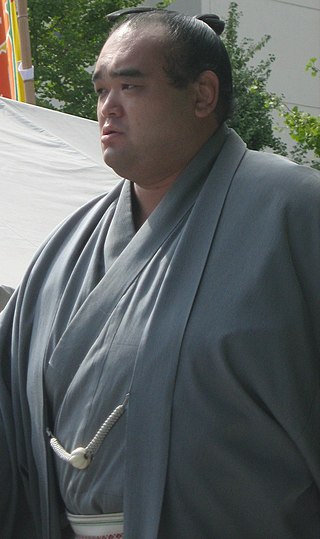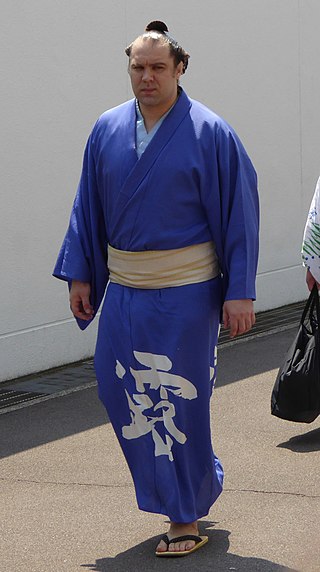Related Research Articles

Hokutōriki Hideki is a former sumo wrestler, from Tochigi, Japan. He reached the top makuuchi division in 2002 and was runner-up in three tournaments. He had four special prizes in his career and a gold star for defeating yokozuna. The highest rank he reached was sekiwake. He retired in May 2011 and is an elder of the Japan Sumo Association and a coach at Kokonoe stable.

Tosanoumi Toshio, is a former sumo wrestler. He first reached the top division of professional sumo in 1995, winning 13 special prizes and earning 11 kinboshi or gold stars for defeating yokozuna over his long career. The highest rank he reached was sekiwake. He retired in 2010 to become a coach at his stable, Isenoumi stable under the name of Tatekawa.

Jūmonji Tomokazu is a former sumo wrestler from Aomori, Japan. Joining the professional ranks in 1992, he reached the top division in 2000 and was ranked there for 34 tournaments until 2007. His highest rank was maegashira 6. He was forced to retire in April 2011 after an investigation by the Japan Sumo Association found him guilty of match-fixing.

Shimotori Norio is a former sumo wrestler from Arai, Niigata Prefecture, Japan. A former amateur champion, he made his professional debut in 2000 and first reached the top division in 2002, although due to injuries he had trouble maintaining that position. He earned one special prize, for Fighting Spirit. His highest rank was komusubi. He was forced to retire in April 2011 after an investigation by the Japan Sumo Association found him guilty of match-fixing.

Tochisakae Atsushi is a former sumo wrestler from Saga Prefecture, Japan. He made his professional debut in 1993, reaching the top division for the first time in 2000. His highest rank was maegashira 1. He suffered many illness and injury problems throughout his career. He retired in 2008 and is now an elder of the Japan Sumo Association under the name of Mihogaseki, working as a coach at Kasugano stable.
Asahikuni Masuo is a former sumo wrestler from Hokkaidō, Japan. His highest rank was ōzeki. After his retirement he set up Ōshima stable which he ran from 1980 until he left the Japan Sumo Association in 2012 upon reaching the age of 65.
Kirinji Kazuharu, real name Kazuharu Tarusawa was a sumo wrestler from Kashiwa, Chiba Prefecture, Japan. He made his professional debut in 1967, reaching the top makuuchi division in 1974. His highest rank was sekiwake. During his long career he won several awards and set a number of longevity records. Upon his retirement in 1988 he became a sumo coach and elder of the Japan Sumo Association, until reaching 65 years of age in 2018.
Oginishiki Yasutoshi is a former sumo wrestler from Ichikawa, Chiba Prefecture, Japan. His highest rank was komusubi. His father and brother were also sumo wrestlers. He is now a coach at Dewanoumi stable.

Bushūyama Takashi is a Japanese former sumo wrestler from Aomori, Aomori Prefecture. He made his professional debut in January 1999. At the age of 32, he was promoted to the top makuuchi division in the November 2008 tournament. His highest rank was maegashira 3. He is now a sumo coach.
Fujizakura Yoshimori (富士櫻栄守) is a former sumo wrestler from Kōfu, Yamanashi, Japan. His highest rank was sekiwake. He wrestled for Takasago stable. He made his debut in 1963 and had one of the longest professional careers of any wrestler, fighting 1613 bouts in total, of which 1543 were consecutive. This latter record is second only to Aobajō. After his retirement in 1985 he was an elder of the Japan Sumo Association and the head coach of Nakamura stable.

Kitataiki Akeyoshi is a former professional sumo wrestler from Machida City, Tokyo, Japan. Making his debut in March 1998, he reached the top division for the first time in September 2008, returning in January 2010. He won two second division jūryō championships in his career. His highest rank was maegashira 2. He retired in January 2018 and became an elder of the Japan Sumo Association under the name of Onogawa.

Myōgiryū Yasunari is a Japanese professional sumo wrestler from Takasago, Hyōgo. Making his debut in May 2009 as a makushita tsukedashi out of university, he reached the top division for the first time in November 2011. His highest rank to date has been sekiwake. He has earned six special prizes for Technique and six kinboshi for defeating yokozuna. He was runner-up in the September 2021 tournament.
Hōō Tomomichi, born Tomomichi Kabetani was a sumo wrestler from Gamagōri, Aichi, Japan. He made his professional debut in September 1971, and reached the top division in July 1979. His highest rank was sekiwake. He is the only sekiwake since the six-tournaments-a-year schedule began in 1958 to never win a sanshō or special prize. He was one of the few wrestlers to face both Takanohana Kenshi and his son Takanohana Kōji, having fought the latter in the makushita division towards the end of his career. He left the sumo world upon retirement in May 1990. He died of heart disease in 2013.
Kaneshiro Kōfuku was a sumo wrestler from Takanabe, Miyazaki, Japan. He made his professional debut in September 1969, and reached the top division in September 1974. His highest rank was sekiwake. He was a runner-up in two tournaments and earned two gold stars and three Fighting Spirit prizes. After retiring in 1987 he opened up a sumo-themed restaurant. He died of a heart attack in 2002.
Terunoumi Masato, also known as Daikikō Masato, born Masato Hayashi, was a sumo wrestler from Gobō, Wakayama, Japan. A former amateur champion, he made his professional debut in 1990. His highest rank was maegashira 15. He was the first wrestler in the six tournaments per year era to reach the top makuuchi division after spending just one tournament in the second highest jūryō division. After injury problems he retired in 1993, and died at the age of 41 in 2009.

Chiyomaru Kazuki is a Japanese professional sumo wrestler from Shibushi, Kagoshima. He made his professional debut in May 2007. He took the second division jūryō championship in his third tournament in the division in January 2014 and was promoted to the top makuuchi division in the following tournament. His highest rank has been maegashira 5 East. He is the older brother of fellow professional sumo wrestler Chiyoōtori, and has served as his younger brother's attendant or tsukebito.

Amūru Mitsuhiro is a former professional sumo wrestler from Lesozavodsk, Primorsky Krai, Russia. After an initial influx of Russian wrestlers from the early 2000s, he was the last ethnic Russian in top level sumo. He made his debut in May 2002 and, after a serious knee injury in 2012 sent him down the rankings, reached the top makuuchi division in November 2014. His highest rank was maegashira 5. He had nine tournaments ranked in the top division, but finished his career in the third highest makushita division.

Seirō Takeshi is a Mongolian former professional sumo wrestler. He made his professional debut in July 2005. After a decade of competing in the lower ranks of sumo he reached the top division for the first time in 2015. His highest rank was maegashira 14. He wrestled for Shikoroyama stable. He retired in July 2020.
The following were the events in professional sumo during 2016.

Ryūden Gōshi is a Japanese professional sumo wrestler from Kōfu, Yamanashi Prefecture. He made his professional debut in March 2006 and first reached the top makuuchi division in January 2018. Ryūden has won a championship in every division except makuuchi and has earned two special prizes, one for Fighting Spirit and one for Technique. His highest rank has been komusubi. He is a member of Takadagawa stable.
References
- ↑ "Hidenohana Yukihide Rikishi Information". Sumo Reference. Retrieved 20 September 2012.